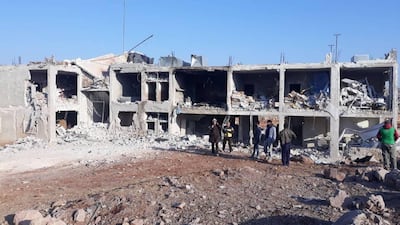It was a slow night at Al Ikhlas Hospital in a rural stretch of southern Idlib when air strikes ripped through the concrete walls, causing so much damage it is unlikely the building can be repaired.
The air strikes hit "right next to the break room", Dr Mustafa, a paediatrician, told The National.
He was resting but fearing another air strike could soon hit, he and other medical staff scrambled to evacuate the hospital, which treats women and children in the village of Shnan.
“There was dust everywhere, and we couldn’t see one another,” Dr Mustafa said. “We were surprised to find one of our technicians stuck under rubble and we helped him to get out.”
The second air strike hit was a direct hit. Doctors said three staff members were wounded and the building was destroyed, probably beyond repair.
Medical director Dr Zuheir Qurat said more than 4,000 women and children from the surrounding countryside relied on the hospital’s services.
There was a sharp rise in bombings across Idlib this week by the Syrian government and its allies, hitting civilian targets including at least four medical centres.
They killed 24 people, including women and children.
Artillery fire also struck a Civil Defence building in the nearby city of Jisr Al Shughour, putting it out of operation.
It is the latest escalation in a months-long aerial and artillery campaign in the area, which is Syria’s last rebel stronghold.
More than 1,000 people have been killed since the bombing campaigns intensified in April, and tens of thousands have fled their homes.
A de-escalation agreement between Turkey and Russia from September of last year was meant to hold off an all-out assault on Idlib, although the air strikes and artillery fire have continued.
Last week’s attack on Al IIkhlas Hospital was the 63rd since April, said Sams, an organisation that supports medical care in Syria.
And in Kafranbel, in southern Idlib, a hospital was struck on Wednesday afternoon, shutting it down temporarily, a doctor who works there said.
Both hospitals are among the dozens that have shared their location co-ordinates with the UN as part of a now widely criticised list that is meant to stop medical centres being accidentally bombed.
But the list was shared with the Syrian government and allies, and with medical care already strained, doctors say the attacks are threatening their safety.
Dr Mustafa said his car and those of others at the hospital were destroyed in the attack.
“I’m still in shock after what happened. Our hospitals are being hit without warning,” he said.
“As medical workers, we never feel safe.”

